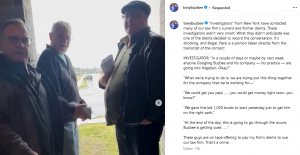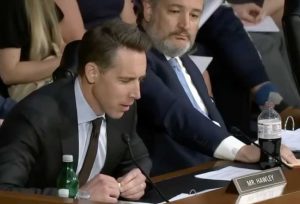Thalia Graves’ lawsuit against Sean "Diddy" Combs faces serious credibility issues after reports of a $3 million bribe offer to her ex-boyfriend. This revelation has been largely ignored by major media, prompting concerns about selective reporting and the influence of high-profile legal figures in shaping narratives.
Allegations of Bribery in Diddy Lawsuit Highlight Media's Selective Reporting

Allegations of Bribery in Diddy Lawsuit Highlight Media's Selective Reporting
The $3 million offer made by Thalia Graves to her ex-boyfriend raises questions about the integrity of her allegations against Sean “Diddy” Combs and the media's responsibility in accurately covering the story.
On September 24, 2024, the *LA Times* reported on a high-profile lawsuit filed by Thalia Graves against music mogul Sean "Diddy" Combs, including allegations of rape accompanied by an emotional press conference featuring Graves and her attorney, Gloria Allred. However, a critical piece of information regarding this case has been notably absent from major news outlets: Graves allegedly attempted to bribe her ex-boyfriend with $3 million to support her claims against Diddy.
Evidence obtained by TMZ uncovered text messages where Thalia reportedly offered this substantial sum, explicitly asking her ex, “What do you n$3 mil?” The ex-boyfriend regarded this communication as a bribe, leading him to block her on all platforms. While the allegations made by Graves have garnered significant attention, the revelation of these text messages and the attempted bribery casts a shadow over the integrity of her claims. Yet, major media organizations, including the *LA Times*, have not reported on this development, raising questions about journalistic integrity.
The absence of coverage is particularly noteworthy given the longstanding connections between key legal figures involved in this case, like Allred and the founder of TMZ, Harvey Levin. Their histories suggest potential conflicts of interest and biased reporting, as both parties have collaborated in high-stakes legal battles before. Critic Paul H. Weaver argues that the intersection of journalism and powerful interests can lead to sensationalism that obscures important facts, a notion that resonates strongly in this scenario, where significant facts about the bribery have been relegated to obscurity.
In response to the allegations of bribery, Allred maintained that it is a common tactic employed by wealthy individuals to discredit accusers. While Allred’s assertion seeks to frame the bribery claim as a smear tactic against her client, the underlying implications of the bribery offer complicate the narrative and raise doubts about the truthfulness of the allegations. Furthermore, Diddy’s former head of security, Joseph Sherman, has stated he neither knew Graves nor was employed by Diddy during the alleged incident, which further muddies the waters.
The reluctance of major news outlets to address these findings suggests a pattern of prioritizing narrative over full transparency. The interplay between legal representation and media coverage risks distorting the public discourse surrounding the case, leaving the general populace with an incomplete understanding. The revelations regarding the bribery must not be overlooked in favor of sensational stories—public trust in media hinges on comprehensive and unbiased reporting.
The case exemplifies the urgent need for the media to address all facets of such incidents. Without a commitment to transparency and impartiality, public confidence in media efficacy may continue to wane, highlighting the necessity for a more responsible and thorough approach to reporting on complex legal matters.





















